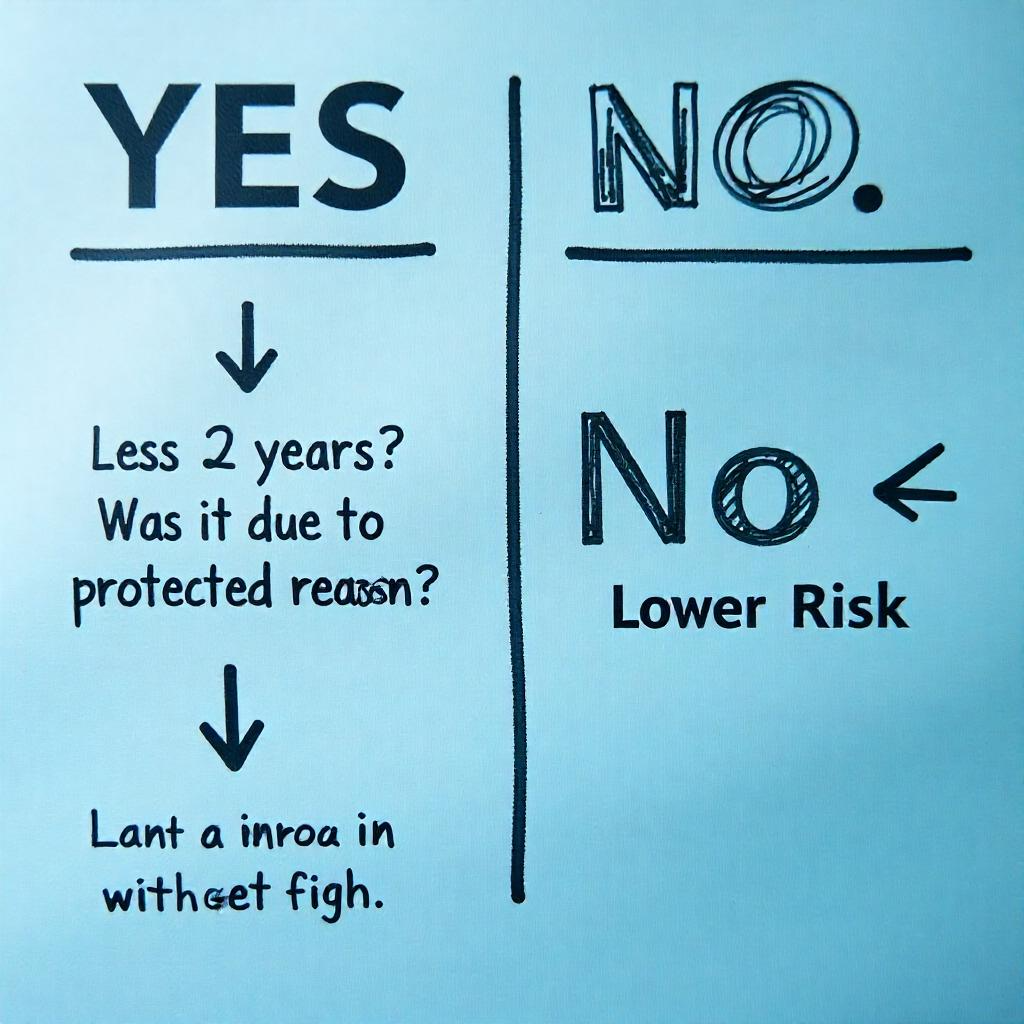Dismissing an Employee with Less Than 2 Years Service UK: What Employers Need to Know
Dismissing an employee with less than 2 years service UK may seem straightforward. But it still carries legal and reputational risks. Many employers assume they can freely terminate short-service employees without consequences, and while they usually can, there are key exceptions that can trigger costly employment tribunal claims.
This guide answers what you legally can and can’t do when ending employment before the 2-year mark. You’ll learn about notice rules, protected rights, common pitfalls, and how to dismiss fairly. Whether you’re an employer navigating a difficult decision or an HR manager looking for best practices, this article provides clear, voice-search-friendly answers tailored for real workplace scenarios in the UK.
Let’s break down everything you need to know step by step to ensure your process is legally sound and ethically handled
Can You Legally Dismiss Someone with Under 2 Years’ Service in the UK?
Dismissing an employee with less than 2 years service UK is legally possible in most situations, as long as the dismissal doesn’t fall under protected grounds. Employees typically gain full legal protection against unfair dismissal only after they’ve completed two continuous years of service.
Before that milestone, employers can usually terminate employment without giving a specific reason, provided they act fairly and follow the proper notice process. Still, the decision must be lawful. You cannot dismiss someone for reasons like discrimination, whistleblowing, or maternity, even if they’ve been with the company for only a few months.
That’s because certain types of dismissal are automatically considered unfair, no matter how long the employee has been in the role. Using a clear process is essential to avoid risk.
Employers should always document the reason for dismissal, provide written notice, and treat the employee with dignity. Following best practice ensures you’re complying with UK dismissal rules for under 2 years and protecting your business from costly tribunal claims.
Is It Mandatory to Give a Reason When Dismissing an Employee Before 2 Years?
Dismissing an employee with less than 2 years service UK generally doesn’t require you to provide a written reason, but offering one is still highly recommended. Legally, you’re not obligated to provide a reason for dismissal before 2 years of service unless the employee specifically requests it in writing. Even then, it only becomes mandatory if they’ve completed one full year.
However, giving a clear, fair reason protects your business. It shows the decision wasn’t based on unlawful grounds, such as discrimination or whistleblowing, both of which can lead to automatic unfair dismissal claims. Keeping a paper trail also strengthens your case if a dispute arises.
Best practice? Always provide a short, honest explanation and issue written reasons for dismissal, even when not legally required. It builds trust, improves transparency, and safeguards against tribunal risks down the line, especially when you’re dealing with short-service employees.

What Legal Protections Apply to Employees with Less Than 2 Years of Service?
An employee with under 2 years of service still has some legal rights, even if full unfair dismissal protection doesn’t apply yet. While they may not qualify for standard unfair dismissal claims, employees still have important rights under UK law.
The two-year qualifying period UK means full unfair dismissal rights usually apply only after two years of continuous employment. But several employee rights under 2 years still exist.
This includes protection from being dismissed for discriminatory reasons like age, gender, race, religion, pregnancy, or disability. They’re also protected if they’ve reported health and safety concerns, acted as a whistleblower, or requested flexible working.
Employees are also entitled to receive proper notice periods, final pay including unused holiday, and a written statement of employment terms if they’ve worked over one month. Ignoring these rights can lead to costly tribunal claims, even without two full years of service. Always act carefully and fairly to minimise legal risk.
Is It Possible to Claim Unfair Dismissal Without 2 Years of Service?
The usual rule is that the right to bring an unfair dismissal case starts only after two continuous years of service. However, there are important exceptions where dismissals are considered automatically unfair, no matter how long the employee has worked.
Dismissing an employee with less than 2 years service uk. These include being dismissed for reasons such as discrimination, whistleblowing, health and safety reporting, or asserting statutory rights like minimum wage or rest breaks.
If an employee believes any of these apply, they may bring a case to an employment tribunal for short service, and your business could face serious consequences.
While the risk of a claim is generally lower for employees with less than two years’ service, it is not completely eliminated. Always ensure you’re dismissing for a fair and lawful reason, and keep accurate records in case your decision is challenged.
When You Can Still Be Sued for Unfair Dismissal
if you terminate an employee who has worked for less than two years. Then it can not protect you from a potential legal claim. Even if an employee hasn’t reached the two-year threshold, they can still sue you if their dismissal falls under automatic unfair dismissal.
Certain situations are protected by law from day one. For instance, dismissing an employee due to pregnancy, maternity leave, whistleblowing, or health and safety issues is unlawful.
The Equality Act 2010 also protects employees with protected characteristics such as age, race, religion, disability, sexual orientation, and gender.They can claim regardless of their age of service. If your dismissal relates to any of the legally protected reasons.
In such cases of dismissing an employee with less than 2 years service uk. Employment tribunals usually take the matter seriously and there is no limit on the compensation awarded for discrimination claims. Always review the circumstances carefully before terminating employment, even when it seems like a “safe” short-service dismissal.
Checklist: How to Dismiss an Employee Legally Under 2 Years
When you dismissing an employee with less than 2 years service uk, it is important to be careful about the reasons. Even without full unfair dismissal rights, mistakes can lead to legal issues. Here’s a quick checklist on how to dismiss someone under 2 years UK the right way:
- Review the reason — Make sure it’s not discriminatory or automatically unfair.
- Follow your process — Apply your disciplinary or capability procedures if relevant.
- Hold a meeting — Let them respond before you decide.
- Put it in writing — Always issue a written dismissal letter with clear notice.
- Pay what’s owed — Include notice, holiday pay, and any final wages.
- Keep records — Document everything, especially if you used a disciplinary process for short-term employees.
Even short-service dismissals should be handled fairly and respectfully. This protects both your business and your reputation.

Dismissal During Probation Period – Is It Different?
Dismissing an employee with less than 2 years service UK often happens during the probation period, but the rules don’t differ much legally. While it usually allows employers to dismiss more easily, you still must follow fair procedures.
Employers can generally dismiss staff before the probation period ends UK without proving misconduct or capability issues, but you must give any contractual notice period. It’s best practice to provide feedback and hold review meetings during probation to avoid surprises.
Despite this flexibility, unfair dismissal claims can still arise if the dismissal is for discriminatory reasons or whistleblowing. Maintaining detailed records throughout the probation period dismissal safeguards your business and promotes transparency.
Treat probation dismissals fairly and with respect to minimize legal risks and maintain good workplace culture.
Do You Still Need to Give Notice and Final Pay?
When dismissing an employee with less than 2 years service UK, you are still legally required to give the employee their contractual notice period, unless you are paying in lieu of notice. The minimum notice depends on how long they have worked, starting from one week’s notice after one month of service.
Along with notice, employers must pay any outstanding wages, including unused holiday entitlement and any other owed benefits. This final pay on dismissal must be calculated carefully to avoid disputes.
Failing to provide proper notice or final pay can lead to claims, even if the employee has worked for less than two years. So, make sure you follow the correct process and communicate clearly to avoid misunderstandings or legal challenges.
[Your Company Letterhead]
Date: [Date]
Employee Name: [Name]
Position: [Position]
Dear [Employee Name],
After reviewing your recent performance and our discussions, we regret to confirm that your employment with [Company Name] will end on [Last Working Day], in accordance with your notice period outlined in your contract.
This outcome follows a thorough review and is based on [brief reason—e.g., performance concerns, conduct issues].
Please return any company property by your final day. Your final pay, including any outstanding holiday pay, will be processed accordingly.
We appreciate the efforts you’ve made during your time with us and extend our best wishes for your future endeavours.
Sincerely,
[Your Name]
[Your Position]
Frequently asked questions and answers about dismissing an employee with less than 2 years service uk
- Can I dismiss an employee under 2 years without a formal hearing?
Yes, legally, you can dismiss without a formal hearing if the contract allows it. However, holding a hearing is best practice to avoid disputes and demonstrate fairness.
- Are employees with less than 2 years entitled to redundancy pay?
No, employees generally need 2 years’ continuous service to qualify for statutory redundancy pay.
- Can dismissal during probation be immediate?
Usually, notice must still be given unless your contract states otherwise, but the notice period may be shorter during probation.
- What happens if I dismiss without giving notice?
The employee may pursue a wrongful dismissal claim and request compensation equal to the pay they would have received during their notice period.
- Is a verbal dismissal legally binding?
Yes, but it’s not recommended. Always provide dismissal in writing to avoid misunderstandings.
- How does the Employment Rights Bill affect dismissals under 2 years?
If passed, the Bill will remove the 2-year qualifying period, meaning unfair dismissal claims could be possible from day one.
- What records should I keep after dismissal?
Keep copies of dismissal letters, meeting notes, evidence supporting the decision, and correspondence for at least 6 years.
- Can part-time employees with under 2 years’ service be dismissed differently?
No, dismissal laws apply equally to part-time and full-time employees.
- Can an employee claim constructive dismissal with less than 2 years?
Yes, employees can claim constructive dismissal if the employer’s behaviour forces them to leave unfairly, regardless of service length.




